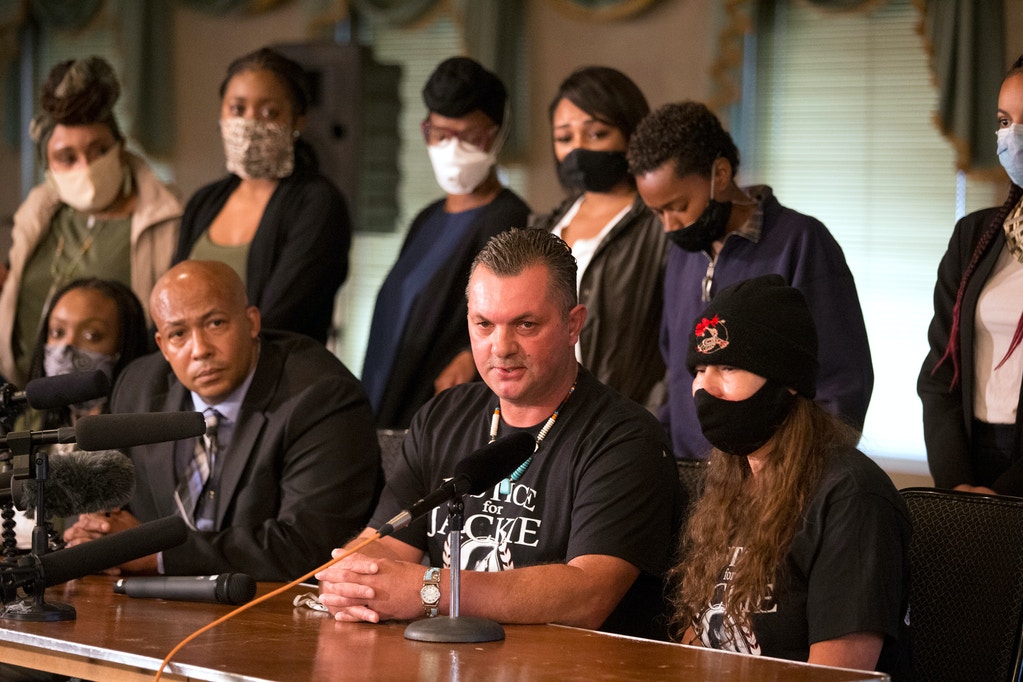In June, after the House passed the Justice in Policing Act, the former mayor of Tacoma, Washington, Marilyn Strickland, released a statement in support of police reform. “The tragic deaths of Breonna Taylor, George Floyd, and Manny Ellis have reinforced that today’s legislation is long past due,” she said. “While no bill will solve the problem on its own, the Justice in Policing Act is an important step toward national reform of our police justice system. We also know the justice system is more than policing and includes prosecutors and judges.”
Strickland, who led Tacoma from 2010 to 2017, is now running for an open seat in Congress in the state’s 10th District, hoping to capitalize on the energy of protests in the city. Strickland, a centrist, has made police accountability a centerpiece of her platform, as has her progressive opponent in November’s general election, Beth Doglio. Strickland has the bulk of establishment support in the race, while her opponent has been backed by Senators Bernie Sanders and Elizabeth Warren, and Washington Rep. Pramila Jayapal.
But despite presenting herself as an advocate for police reform, Strickland presided over a controversial department with a history of excessive force and failed to implement even marginal promised reforms like body cameras.
In fact, Strickland’s record on policing is a testament to the overdue nature of the Justice in Policing Act. During her time as mayor, the Tacoma department faced controversy over an officer’s murder of a young Native American mother in 2016 and another officer’s brutality toward a 15-year-old Black girl in 2014. In 2018, a white police officer sued the city alleging that it had fired him in 2017 for not shooting to kill a suspect, and the city was found to have illegally withheld public records related to his termination in his disciplinary investigation. In 2013, the Tacoma Police Department paralyzed a Vietnamese American man despite the fact that he was not a danger to the police. In 2009, the largest contributor to Strickland’s first campaign for mayor was the Tacoma Police Union.
In a comprehensive review of the department’s policies and data, the American Civil Liberties Union of Washington found that from January 2010 to September 2015, the Tacoma Police Department took “a hindsight-oriented approach to reviewing use of force incidents, and almost always reaches a conclusion justifying the amount of force used.”
Rep. Karen Bass speaks during an event with members of the Democratic caucus before a vote on the George Floyd Justice in Policing Act of 2020 in Washington, D.C., on June 25, 2020.
Photo: Stefani Reynolds/Bloomberg/Getty Images
The Justice in Policing Act, among other things, creates incentives for localities to ban no-knock raids. In 2011, as Strickland was mayor, the Tacoma police brutalized a 62-year-old nurse when they performed a no-knock raid at the wrong address. The city then fought Mancini’s lawsuit in court for five years, arguing that the city was immune from liability. The legislation additionally creates incentives for all police to use body cameras. Despite the police chief and Strickland promising body cams in February 2016 within two to three years, the Tacoma police are still not wearing them. Finally, the bill bans chokeholds. The city of Tacoma didn’t ban chokeholds until this past June after the Tacoma police choked a man, Manuel Elllis, during an arrest that led to his death.
“The long history of excessive force and misconduct in Tacoma demonstrates and exposes deep cultural and structural issues within the department,” said Michele Storms, executive director of the ACLU of Washington in response to a request for comment from The Intercept. “For meaningful, lasting progress to happen in Tacoma, profound changes must occur. Denials and delays cost lives.”
Problems with the Tacoma Police Department were thrust onto the national stage four years before Strickland’s election to the city council in 2007. In 2003, after a volatile two-year tenure, the Tacoma chief of police, a 21-year veteran of the department, murdered his wife and then killed himself. David Brame had been hired and promoted despite concerns about his psychological health and a rape allegation. Over two weeks before her death in April 2003, Crystal Brame called 911 and told the dispatcher of “numerous death threats from my husband.” As Brame’s mental health deteriorated further over the following weeks, the people around him failed to blow the whistle to the city manager, the mayor, and city council. That included Assistant Chief Don Ramsdell, who had been twice promoted by Brame and worked with Brame closely. Ramsdell confirmed to state investigators that he knew about the domestic violence allegations prior to the murder-suicide.
Ramsdell was promoted to chief soon after the Brame murder-suicide. Crystal Brame’s family sued the city for $75 million and settled for $12 million. A six-month investigation by then-Attorney General Christine Gregoire found “examples of misconduct, poor judgment, troublesome behavior by top officers, lax accountability” by the department’s leadership and painted “a picture of a very troubled management culture in the police department.” The AG’s report led Bill Baarsma, the then-mayor, to question whether Ramsdell should step down as police chief.

Photo: John Froschauer/AP
Instead, Ramsdell hung on for 17 more years, as major blunders and human rights violations by the department piled up — and for the full eight-year duration of Strickland’s mayoral tenure. Tacoma has a weak-mayor form of city government, which means that the mayor does not directly supervise the police department, but does oversee the department’s annual budget and the appointment of the city manager, who in turn appoints the chief of police.
The average tenure of a big city police chief is two and a half to three years. In 2007, a 12-year-old Tacoma girl was kidnapped and murdered, and an Amber Alert that could have saved her life was not issued because an officer fell back to sleep. That officer was kept on the force for at least four years following the incident, well into Strickland’s tenure as mayor. And when more information came to light in 2011, Strickland refused to support disciplining the officer who fell asleep and publicly defended the department’s actions in the case. The city manager reprimanded Ramsdell in the case. On Strickland’s watch, the city of Tacoma’s attorneys made the argument that the city had no legal obligation to issue an Amber Alert in the case.
Concerns around the Tacoma Police Department’s culture and conduct came to a head on January 27, 2016, when Jackie Salyers, a 32-year-old member of the Puyallup tribe, was killed by police officers attempting to serve a warrant on her boyfriend. Salyers’s uncle, James Rideout, told The Intercept that there were many unanswered questions surrounding his niece’s death.
“They had the scene completely blocked off,” said Rideout. “Blocks and blocks blocked off. Perimeter like I’ve never seen before. I had seen a different shooting, and it wasn’t contained like that. When I left, I got pictures sent to me that my niece was removed to the scene. She was taken off the scene and put under a tarp a block away,” said Rideout. “It took several days, if not a month later for the police chief to come and speak to our tribal council about what happened,” said Rideout.
To achieve justice for Salyers’s death, Rideout and the Puyallup tribe led a successful campaign to pass legislation that would end the presumption of justification for officer-involved shootings in Washington state. Despite the fact that the campaign was led from Tacoma, Rideout said that Strickland had little involvement. “We didn’t have a whole lot of interaction with her,” said Rideout. Strickland never reached out to the family in the next two years of her mayoralty. The shooting was ruled as justified by the Tacoma Police Department.
One of the officers involved, Aaron Joseph, had been arrested on domestic violence charges six years before, at the beginning of Strickland’s tenure, though Ramsdell had pledged in 2003 that he would not accept domestic violence by officers under his command.

The Rideouts attended a press conference with lawyer James Bible in Tacoma, Wash., because their niece and daughter, Jacqueline Salyers, was killed by a Tacoma police officer in 2016 on June 9, 2020.
Photo: Karen Ducey/Getty Images
The ACLU-WA’s 2010-2015 investigation revealed that “the Department rejects nearly all civilian complaints about unnecessary force.” The ACLU-WA additionally found that “the Department sustained zero complaints of police bias or racial profiling, despite regularly receiving complaints about this issue,” and that the “vast majority” of civilian complaints against police were “exonerated, unfounded, or not sustained.” The letter also describes how in 2012, Tacoma police tased and handcuffed an “innocent deaf woman after she called 911 for their help because she was being beaten” the letter states. “She specifically told dispatch she was deaf, yet police reports describe her as ‘ignoring’ their commands.”
Strickland remained loyal to the police after she left office in January 2018. Soon thereafter, Strickland was tapped to lead the Seattle Metropolitan Chamber of Commerce, which in 2019 spent over $700,000 to defeat critics of police violence running for the Seattle City Council, notably left-wing activists Tammy Morales, Kshama Sawant, Lisa Herbold, and Shaun Scott, who all made police reform centerpieces of their campaigns.
Strickland explicitly stated that candidates’ positions on policing played a role in their endorsement processes. “There is what I call the street population, and then there are people who are homeless and they’re not necessarily one and the same,” Strickland said at the time. “There are people that are a part of the street population who do things that are antisocial, and there are people who are homeless. And sometimes I think we just say they are one and the same.” The C is for Crank blog reported at the time that the Chamber’s political action committee “was impressed, Strickland said, by candidates who understood the ‘difference between the two’ groups.”
The Intercept sent Strickland and Ramsdell a detailed list of questions. Strickland declined to answer any specific questions about her record, but said that she “is committed to giving voice to all members of our community and providing our nation’s policing units the accountability they need to serve, protect, and respect all of America’s communities, regardless of race or ethnicity,” and pledged again her support for the Justice in Policing Act. Strickland campaign spokesperson Mark Prentice also pointed The Intercept toward Project PEACE, a communication project between the police and community leaders, which did not appear to lead to any policy or personnel changes at the Tacoma Police Department, and the Mayor’s support for I-940, an initiative led by the Puyallup tribe to reduce police impunity. Rideout said that the mayor had little involvement in the campaign.
Matthew Cunningham-Cook | Radio Free (2020-09-10T18:08:40+00:00) Once a Police Union Ally, Democratic House Candidate Pitches Herself as a Reformer. Retrieved from https://www.radiofree.org/2020/09/10/once-a-police-union-ally-democratic-house-candidate-pitches-herself-as-a-reformer/
Please log in to upload a file.
There are no updates yet.
Click the Upload button above to add an update.
